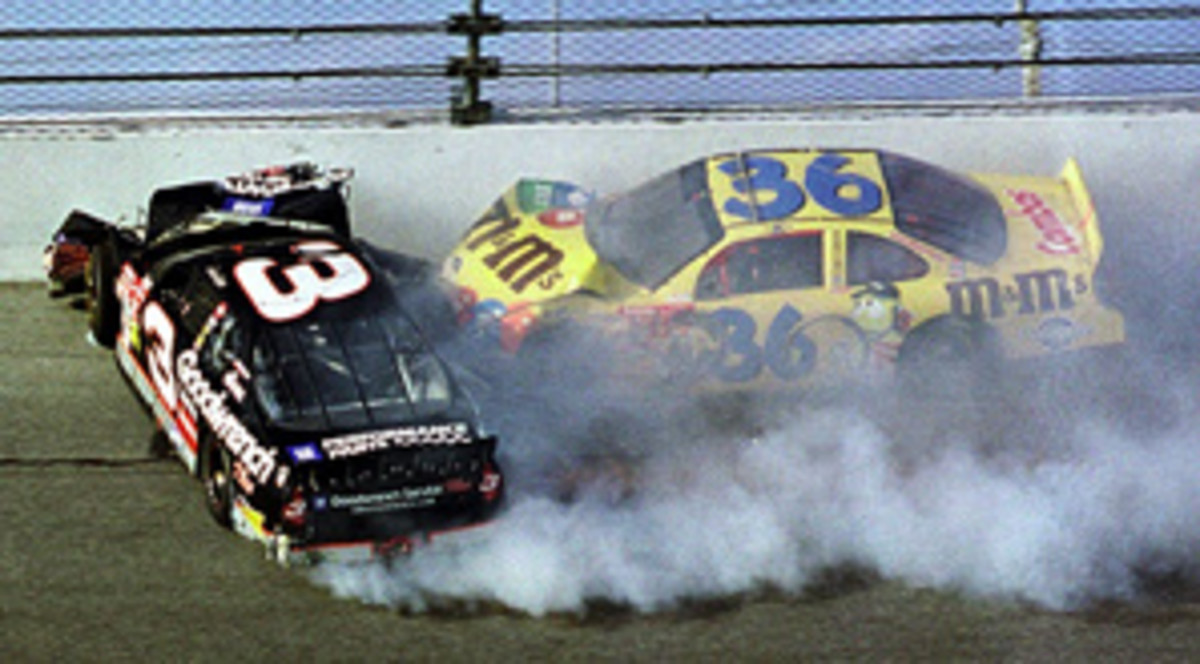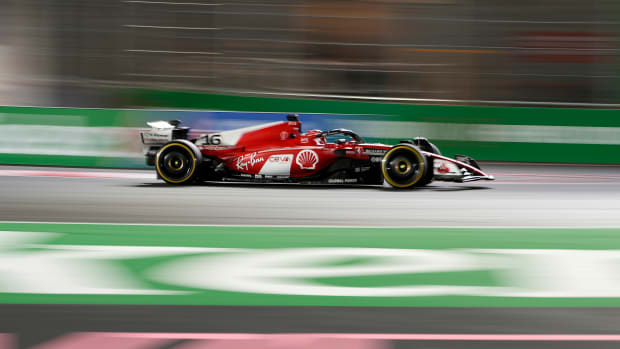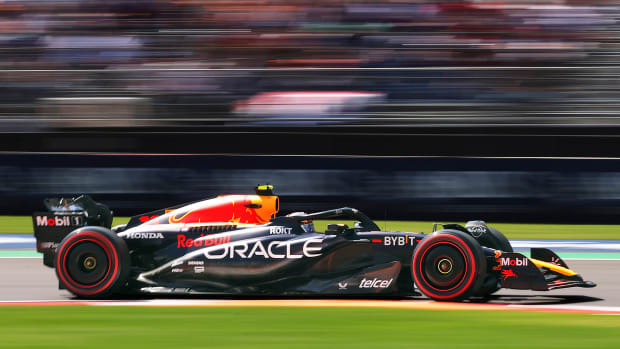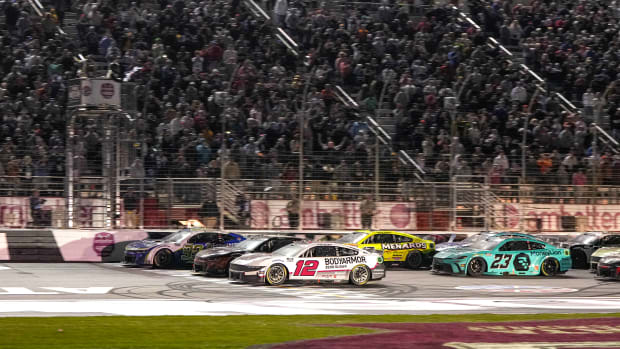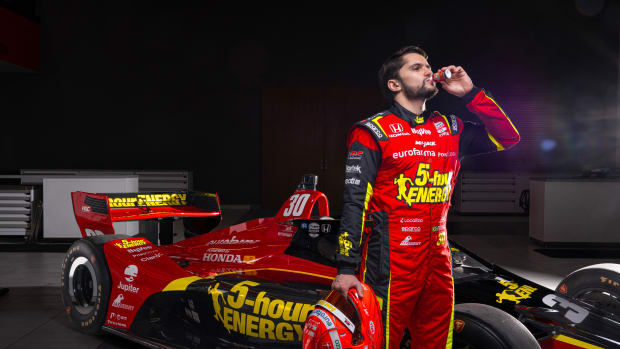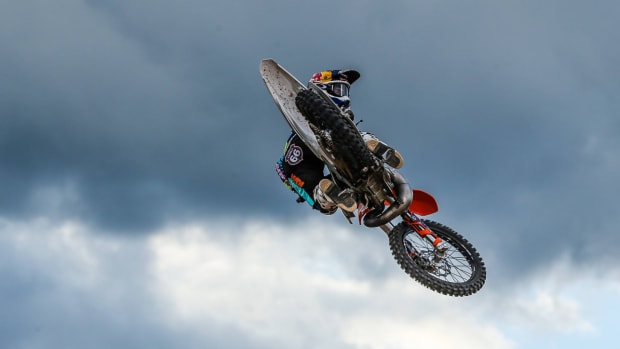Hard to deny the appeal of spectacular crashes
What is to be said for those NASCAR fans whose guilty souls are cracked open by Deputy Travis Junior?
Describing his anticipation of winning the chance to witness a state execution, the race-loving, Kevlar- and sunglasses-swathed Reno 911! character cooed, "(It's) like getting tickets right up front at NASCAR and ya know that Jeff Gordon is gonna die."
Danger is undeniably part of racing's intoxicating allure for many fans. It can be couched or catalogued as the exhilaration of speed and the titillation of possible peril coupled with the hope that it never comes. Only the most deviant would actually find joy in the injury of driver -- and that same kind of deviancy can be found in the idiots who hope that despised athletes don't get up off the field after they've been jacked up -- but drivers know that some fans simply consider the shriek of twisting metal and the sooty taste of tires scraping across pavement as part of the show.
Races at Talladega Superspeedway are among the most popular of the season for a simple reason: cars have finished the race wadded into balls like beer cans. Bristol, the same.
"In all honesty, I like a crash, but I want to see good racing, side by side," said Linda Cutone, a long-time Boston-area NASCAR fan. "I like all the drivers for the most part, and crashes happen, and it is allegedly good for TV ratings. I was more excited to see the donut marks on Kyle (Busch)'s car (from Juan Pablo Montoya on Sunday at Loudon, N.H.) then to see them spin and crash. I love it when a driver can get loose or get slightly edgy and start to spin and save the car. That rocks. I am the first one to yell, when someone crashes, get them out of the car so I know he is safe."
Indeed, safety innovations since Dale Earnhardt's death on the final lap of the 2001 Daytona 500 have allowed fans the guilty pleasure of a melee without as much worry of serious injury. Jerry Nadeau, who suffered severe brain trauma during a practice at Richmond International Raceway in 2003, is the last Sprint Cup driver to have a career-ending injury in a race car.
Amazingly, no driver had missed a Sprint Cup start because of injuries received while racing until Ricky Rudd -- ironically the sport's record-holder with 788 consecutive starts -- sat out five races after separating a shoulder in a vicious crash at Fontana, Cal., in 2007. Dario Franchitti lost five after breaking his ankle in a Nationwide Series race at Talladega this April.
The new boxier, ostensibly safer race car employed in the Sprint Cup series and SAFER barrier soft-wall technology first advocated by the Indy Racing League have made a still-dangerous professional more civil than at any time during NASCAR's half-century as a major sanctioned sport.
"I still cheer wrecks," said Kurt Allen Smith of Turnersville, N.J. "I am ashamed to admit it even after cheering seeing Dale Earnhardt in the infield grass. Now it is only when someone on a rival fantasy team wrecks, but I still say a prayer that the driver is okay, no matter who it is. (And) I don't think wrecks make for great racing, except at a venue like Bristol where you sort of expect it. Sometimes the best racing is when two great drivers battle as hard as they can and still don't wreck."
Though they are prone to cheering wrecks -- especially if the unfortunate participant is someone they're not particularly fond of -- fans still subconsciously associate crashes with Earnhardt Sr.'s death. He remains the last NASCAR driver to perish in a race.
In a Feb. 22, 2001 letter to the editor of Salon.com, just days after the seven-time champion and the sport's all-time icon died, reader Jeff Crook wrote poignantly: "Every time a driver is killed, the sport is lessened. Every time a driver dies on the track, you wonder why they take such risks.
But part of what makes racing so appealing is the risk it entails. If they were driving bumper cars, no one would watch, and probably the drivers wouldn't race. Like the commentator said on CNN/SI, we've seen Dale wreck a thousand times. I have seen him in wrecks that I thought he couldn't survive. I've seen other drivers in wrecks that seemed impossible to live through, yet they did. And that is part of the dramatic appeal of racing, as horrible as it sounds. I do not enjoy wrecks -- not like some fans, who hoot and holler at the sight of smoke and spinning cars. I would watch racing if there were no wrecks. But if the danger of those wrecks did not exist, racing would have little appeal.
Racing isn't a game. It draws directly on the human desire to witness the immortality of a driver who can crawl from a pile of twisted metal and wave to the crowd. What shocks, what appalls the sensibilities, is when they don't walk away, when the god is cut low at the height of his power and beauty."
